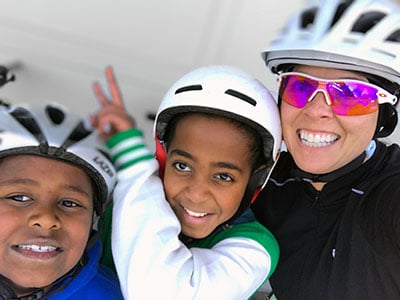One can experience some profound existential moments while riding a road bike up and down the Western Slope. For Kari Weirath, who co-owns a bicycle shop in Grand Junction with her husband, such moments became more frequent after completing her PhD in Caring Science at the University of Colorado College of Nursing in August and pondering the direction of her career of serving others.

Downtime fun for Kari Weirath and her children |
“You definitely feel connected to nature itself riding through Fruita (Colorado) with its farms, cows, and sheep,” says Weirath of her surroundings. “I process a lot while riding. It’s like meditation, but your mind is working through things. You solve problems, come up with ideas, and it feels good to go fast and climb hills. I like going by myself for those reasons.”
For nearly 20 years, Weirath (PhD, PMHNP, RN) has been connected to the community as a psych nurse practitioner for the Veteran’s Administration’s Western Colorado Healthcare System. She works in a Grand Junction outpatient mental health clinic that serves veterans, and runs a residency program within the clinic while raising two Ethiopian-born sons.
Transitioning her career focus
Though the work at the VA is meaningful, Weirath became more intrigued by end-of-life issues – applying a caring science lens – as she grew older.
“I was drawn into becoming an end-of-life doula,” she says. Weirath studied the work of Tarron Estes, founder of the Conscious Dying Institute. Estes also is Associate Faculty with Jean Watson’s Watson Caring Science Institute. A CU Nursing alumna and former dean of the College, Watson established CU Nursing’s first doctoral program and the first clinical doctorate and is renowned throughout the world for her theory of human caring.
Between her studies, Weirath noticed that acute care nurses struggled throughout the pandemic to make the switch from treatment to end-of-life care.
“They have horrible PTSD,” she says. “They are hurt and depressed. You can see it on their faces. I believe we’re going to see the fallout from the pandemic for a long time.”
“So many providers look into the science of trials and outcomes, but the caring science piece is sorely lacking.”
– CU Nursing PhD Graduate Kari Weirath, PhD, PMHNP, RN
Enrolling in CU Nursing
Weirath enrolled in the Doctor of Philosophy (PhD) in Nursing program at CU Nursing on the Caring Science track. Her dissertation focused on how caring science methodologies could benefit acute care nurses.
“I wanted to gain an understanding of the challenges nurses face and how caring science can help,” Weirath says. “So many providers look into the science of trials and outcomes, but the caring science piece is sorely lacking.”
In her research, Weirath interviewed dozens of nurses from the Western Slope and the Front Range. Her research revealed serious emotional and psychological challenges facing nurses throughout the pandemic. While Weirath believes that integrating caring science into acute care could help, she acknowledges there’s much work to be done in implementing such approaches into traditional medicine. As an aspiring educator, she would like to be part of the solution.
Takeaways from the program
Weirath admits that she wasn’t prepared for the intensity of the PhD program, but the experience was ultimately life changing.
Among many other things, the curriculum covered different philosophers and the idea of “collective consciousness.” In particular, Dr. Larry Dossey’s book, “One Mind: How Individual Mind is Part of a Greater Consciousness and Why it Matters” resonated with her.
“We are connected with one mind and a common energy,” she says. “I really do believe that. For me, this program inspired a complete change in the way I think, love, and feel.”
Her advice to future PhD students: “Do all of your reading and look at the details of instructions.”



